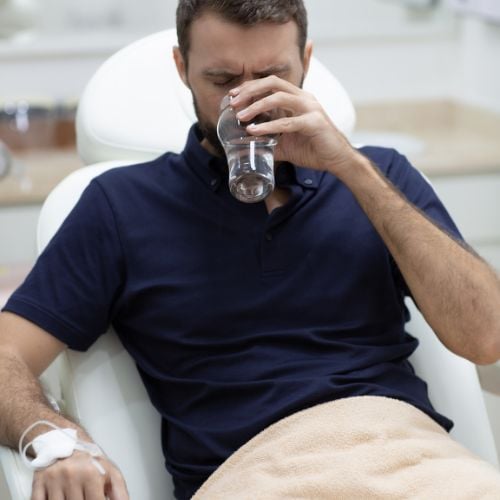Prevent Infusion Side Effects with Smart Hydration
If you’re receiving Intravenous Immunoglobulin (IVIg) or Subcutaneous Immunoglobulin (SCIg), you know how important it is to follow your care team’s guidance closely. Part of that care is making sure you get the most out of Ig therapy, and one of the best places to start is by staying hydrated before, during, and after your treatment.
Staying hydrated during Ig therapy isn’t just about drinking water; it’s about setting yourself up for a smoother infusion treatment with fewer side effects and better results.
Whether you’re preparing for your first infusion or you’ve been managing chronic or rare conditions long-term, here’s what to know about hydration and why it matters so much for your success.
Why Hydration Matters During Ig Therapy
Staying hydrated plays a crucial role in infusion therapy, especially when it comes to IVIg or SCIg. Proper hydration:
- Helps your body absorb and process immunoglobulin treatments more efficiently
- Makes it easier for your nurse to find a vein for an IV
- Supports healthy blood pressure throughout treatment
- Reduces your risk of common infusion-related side effects, like headaches, dizziness, or fatigue
At CSI Pharmacy, we follow the Immunoglobulin National Society (IgNS) standards of care which emphasizes hydration as a core part of patient education and success.
How Hydration Supports Your Body During Ig Treatments

Water does a lot more than quench your thirst, it helps your entire body function better. During your infusion treatment, it helps your body:
- Regulate blood pressure throughout your infusion
- Transport nutrients and remove waste, supporting your immune and kidney function
- Lubricate joints, tissues, and organs, keeping you comfortable
- Maintain a healthy body temperature, especially during longer infusions
For patients with chronic or rare diseases, a well-hydrated body helps you stay resilient and responsive to therapy. It’s one of the most important ways you can support yourself during infusions.
Start hydrating early to make sure your body is ready for treatment. As a general rule, women should aim for 11.5 cups of water, while men should consume 15.5 cups of water.
Here’s a simple schedule to guide you through your infusion day:
1. Start Early
Begin drinking water at least 24 hours before your infusion.
2. Sip Steadily
Take 30 ml (about 2 big gulps) every 3-5 minutes.
3. Stay Consistent
Continue drinking throughout the infusion and the day after.
Pro tip: Set an alarm on your phone or use a hydration app to stay on track. A single 8 oz cup of water can be finished in about 30-40 minutes with this schedule. And if plain water isn’t your thing, try adding drinks with electrolytes or naturally flavored water for variety. Using these small steps can make a big impact on your infusion experience.

Some people may need to limit how much fluid they drink for medical reasons. Please check with your doctor or healthcare provider before following the recommendations above to make sure they’re right for you.
Additional Tips for Staying Hydrated and Comfortable
Beyond drinking water, there are several other ways to help you feel more comfortable during and after your treatment. Avoid drinking alcohol or caffeinated beverages like coffee and soda, as that can make a big difference. These drinks act as diuretics, meaning they can cause fluid loss and make it harder for your body to stay hydrated.
It also helps to eat a light meal about one to two hours before your infusion. This can stabilize your blood sugar, reduce the chances of dizziness or nausea, and help you feel more grounded during treatment. In addition, check your fluid intake the day before your infusion. Gradually increasing your hydration is often more effective and more comfortable than trying to drink large amounts right before your treatment.
Help Prevent Common Side Effects from Dehydration
Dehydration can make Ig infusions more difficult than they need to be. Without enough fluids, patients may experience common side effects like headaches, dizziness, fatigue, or difficulty starting an IV due to lack of accessible veins. By staying properly hydrated, you help your body tolerate treatment more comfortably, speed up recovery time, and reduce the chances of complications. It’s one of the easiest and most effective steps you can take to support successful Ig therapy.
At CSI Pharmacy, we believe that great care goes beyond the medication itself. From personalized hydration tips to compassionate, one-on-one support, we’re here to make every infusion as smooth and effective as possible. If you have questions about your treatment, or how to better prepare for your next infusion, don’t hesitate to reach out to our expert care team. We’re with you every step of the way.